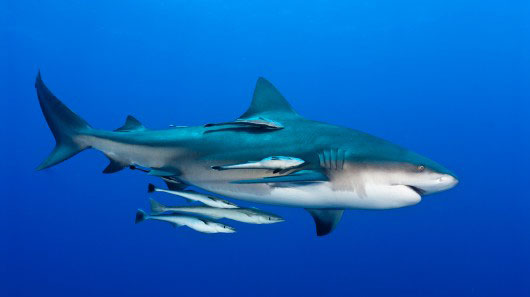In a reef environment, a few species of grouper have learned
to open their mouths wide to allow the tiny tropical reef shrimp to swim
inside. Instead of luring these shrimp to their death, the grouper let the
shrimp eat any parasites that have attached themselves inside the grouper’s
mouth. As a result, the grouper is now parasite free, and the shrimp get to
have a nice meal. Similarly to the grouper and shrimp, Remora fish have evolved
their bodies to be streamlined, and have gradually flattened the top portion of
their head to form a suction cup. This is due to their symbiotic relationship
with many different shark species. The Remora stick to the underside of sharks,
and ride the shark as it swims around in search food. Sharks are messy eaters,
and the Remora will pick up any scraps that the shark has missed. Just like the
shrimp, the Remora will also clean any parasites off of the outside of the
shark’s body. Sharks will happily allow multiple Remoras to stick to their
underside as they swim around, and will not target these fish as a food source.
In nature, the general rule is usually survival of the
fittest. However, there are a few select cases in which the relationship
between two organisms is not simply predator prey, or coexisting without interaction.
This relationship is when two organisms live together in harmony, or almost a
partnership, in which both organisms benefit from each other’s actions. Basically,
two completely differing organisms, usually a predator and a smaller prey
species, help each other out in an agreement
for the predator to not eat the prey. In turn, the prey provide some kind of
cleaning service for the predator, most commonly removing harmful parasites
from the predator’s body.
Yesterday, we went to the Eco Discovery Center in Key West. There,
on an interactive screen, I learned about shrimp cleaning parasites out of Tiger
groupers mouth’s. (Here is an absolutely terrible picture of the screen showing
the shrimp inside of the grouper’s mouth. Additionally, today while we were
shark tagging we saw multiple Remora stuck to the bottom of the two sandbar sharks
we caught. The Remora stuck to the bottom of the shark even after being pulled
almost all the way to the surface. They must be very devoted to their symbiotic
partnership to stay with the shark until the very end when we pulled them to
the surface off of the back of the boat.
http://animaldiversity.org/accounts/Remora_remora/
https://www.spotmydive.com/en/news/cleaning-symbiosis-cleaner-fish-and-shrimp


First off, bonus points for the SpongeBob reference in the title. Secondly, I think it's really amazing that some animals in the wild have such successful relationships like this. You would never think a hungry shark would let tasty little fish so close and not even think about having them for lunch. I guess the saying is true, fish are friends not food.
ReplyDeleteThank you for telling my it was a sponge bob reference because i dodnt get it but i also never watched spongbob. Also it is interesting how the sharks could have an easy meal with the remora but they choose not to. They remora must be good at cleaning parasites off and the shark realizes that.
ReplyDeleteWhile I knew about the shark and Remora bond, had no idea about the shrimp and tiger grouper symbiotic relationship. The tiger grouper is one ugly dude, those shrimp are a lot braver than I am to get near those teeth. Cool blog topic and like Amy, nice Spongebob reference.
ReplyDeleteI really enjoyed the title along with the episode of Spongebob it came from. I really like the article itself because its unusual for animals to help each other when one animal could easily be prey for the animal its helping. The article was a very interesting read, the examples helped me get a better idea of ways that animals will assist each other when they are of two different species.
ReplyDelete